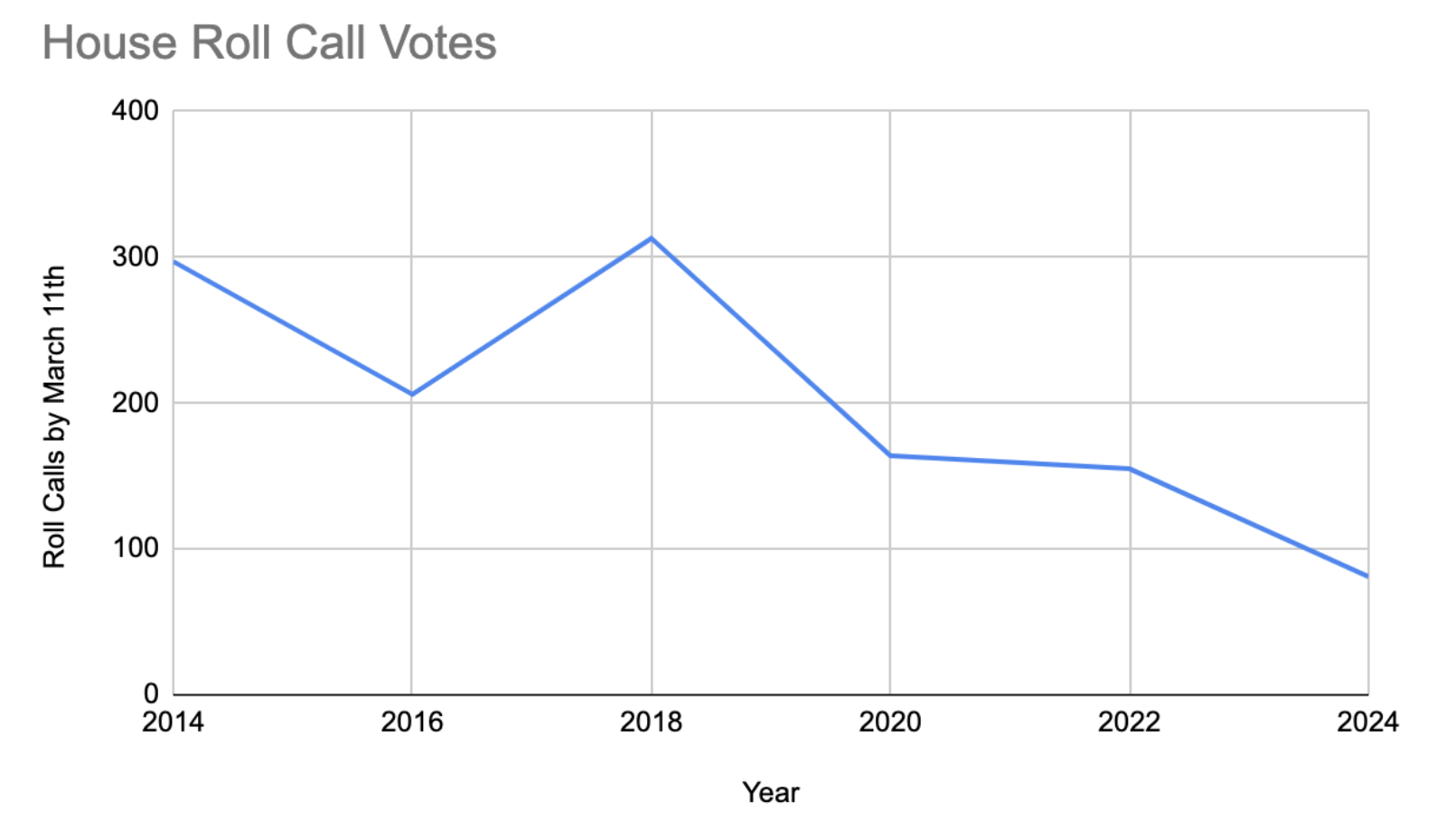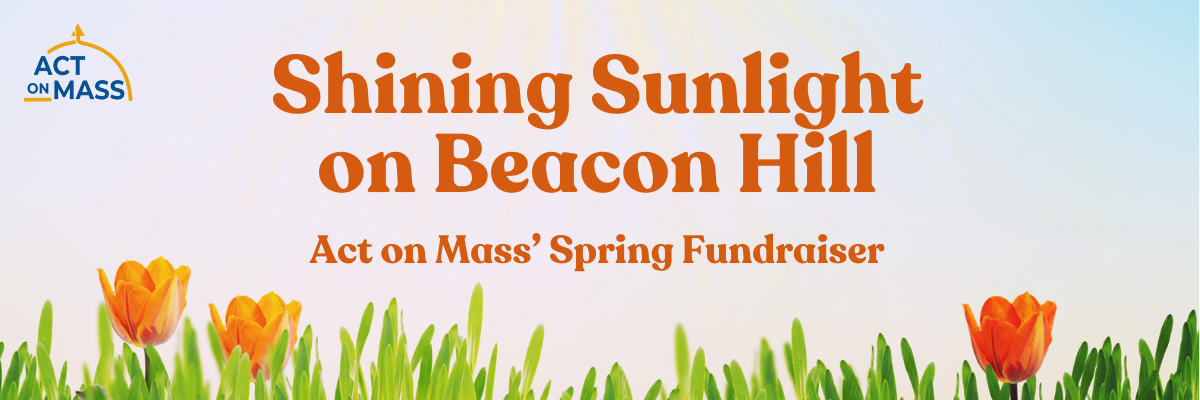Happy spring, friend!
And what a classic first week of New England spring it’s been! Which is to say, cold, windy, wet, and cloudy.
*sigh* I guess Sunshine Week couldn’t last forever.
Speaking of gloomy seasons, it’s also tax season across the country. Here in the Bay State, this is the first tax season since the infamous tax cut bill was passed into law in the fall. In case you’ve forgotten (or mentally blocked it), this is the tax package that costs $1 billion annually and is disproportionately benefiting the wealthy and corporations.
Or, as Governor Healey puts it in her new digital ad campaign, it’s “Making Massachusetts more affordable.”
These tax cuts save low-income seniors a max of $1,200 per year, low-income parents a max of $700 per year, and renters a whopping $50 per year. The top 1% wealthiest Bay Staters, on the other hand, save an average of $3,600 per year, and heirs to large fortunes will save $99,000. None of this is to mention the tax cut for multi-state corporations which now costs taxpayers $85 million annually.
We’ve said it before, and we’ll say it again: these tax cuts make the state more affordable for whom, governor? A quarter of young people in the Boston Area intend to move out of the area within the next five years, according to a recent survey. What are some of the main factors respondents cited as reasons they may leave? “Ability to buy a home” and “cost of rent.”
But hey, maybe if they see Governor Healey’s ad and learn about the extra $50 they should receive as renters this year, that might just convince them to stay!
--
State House Scoop
Massachusetts poised to become the 49th state to ban revenge porn
In a unanimous vote, the Senate passed their version of a revenge porn bill on Thursday that’s been years in the making, and if signed into law, would make Massachusetts the penultimate state to ban revenge porn.
Doesn’t it feel great to lead the nation on policy? 🙄
The bill now goes to a closed-door conference committee where members are hand-picked by leadership to hash out differences between the versions passed in the House and Senate. The bills diverge in a few key areas, including which institution should oversee education and diversion programming for teens involved in sexting, and how long prosecutors can pursue charges in certain abuse cases.
This issue was a longtime priority of former Governor Baker, who lamented the Legislature’s failure to get the bill to his desk during his tenure. But don’t roll out the victory wagon just yet; last session, the House unanimously passed the bill only for it to idle in the Senate for seven months. In the final week of the term, the Senate passed it with some changes, sending the bill back to the House. Ultimately, the bill died during the chaos of the end of session crunch, meaning it had to be refiled this session so it could go through the whole legislative process, yet again. In the MA Legislature, it truly is never over ‘till it’s over.
Governor Healey announces plan for blanket marijuana possession pardons
Speaking of years in the making: this week Governor Healey announced her plan to pardon people convicted of marijuana possession, marking a historic change in policy that could impact tens of thousands of Bay Staters, and right a wrong that has vastly disproportionately impacted people of color. For example, according to a report from the ACLU, 24% of those arrested for marijuana possession in 2014 were Black, despite being just 8% of the state’s population at the time.
The governor’s pardon recommendation now goes to the Governor’s Council for approval. You may recall that back in 2022 Joe Biden pardoned and commuted the sentences of thousands of people with federal simple marijuana possession charges, and called on governors to do the same in their respective states. Since then, Healey has only pardoned 13. While Healey initially opposed marijuana legalization citing concerns for public health, she has since changed her stance, stating those concerns to now be “unnecessary.” Gee, you think? This shift in opinion from the governor could mean the livelihood of thousands would improve nearly overnight by removing barriers to education, housing, and employment for people convicted of marijuana possession — something that has been legal in Massachusetts since 2016.
These pardons are an enormous victory for many currently and formerly incarcerated people and marginalized communities in the state. But this is only the beginning; we still have a long way to go in terms of addressing issues in the prison system as a whole in the Bay State. Yes, and.
--
Missed a Scoop or two? You can find a full archive of all past Saturday Scoops on our blog.
--
House has taken half the amount of recorded votes typical in recent years
Remember when I told Adam Reilly on GBH last week that 2023 was a banner year for bad governance on Beacon Hill? Well, I wasn’t kidding. Thanks to numbers crunched by our good friend Jonathan Cohn at Progressive Mass, we now know that the House has taken fewer than half the number of recorded votes this session to date than in recent sessions. As of March 11th this year, the House had taken just 81 recorded votes. Let’s see how that compares to roll call votes taken as of March 11th in the last 6 sessions:

In a word: bleak.
In two words? Very bleak.
Although they’re not as bad as the House, the Senate has also seen a sharp decline in roll call votes; they’ve taken 114 recorded votes at this point this session, compared to 135 in 2022, and 186 in 2020.
So, what does it mean that our lawmakers are taking half as many roll call votes as they used to? For starters, it’s indicative of the fact that legislating is increasingly done with few, near-unanimous votes on mega-bills with dozens of policy items. When lawmakers only get to vote “yea” or “nay” on dozens of policy items, their stances on individual bills are not available to the public.
Most roll call votes come on amendments to bills already on the floor, but even those have dropped off; it’s well understood that in state house culture, to request a roll call on an amendment not preordained by leadership is considered a major transgression worthy of punishment like loss of committee chair positions, reduced funding for one’s district in the budget, and social isolation from your peers. They even have a term for it — it’s called “spotting” your colleagues, because by making them take a vote, you’re “putting them on the spot.” You know, making them do their job.
The upshot: we shouldn’t just be troubled that there are fewer roll call votes, but that those votes in and of themselves have become largely ceremonial. By the time a bill comes to the floor, the decision-making has already been done by a handful of people in a closed-door meeting. This throws a major wrench in our democracy: how can constituents hold their legislators accountable when they don’t know their stances on the issues? How can a legislator represent the will of their constituents when they rarely take votes? And how can a legislator represent their constituents when they are convinced that the votes they do take can’t change the outcome?
--
Take Action

Snag a ticket for our Spring Fundraiser on April 7th!
Join Act on Mass and Senator Jamie Eldridge, lead sponsor of the Sunlight Act, for a genuine conversation about the broken state of our democracy on Beacon Hill and how we can work together to fix it! Tickets are limited, so get them while you can!
- Shining Sunlight on Beacon Hill: A Conversation with Senator Jamie Eldridge & Act on Mass
- When: Sunday April 7, 2:00 - 4:00 PM
- Where: Wellesley (exact address will be provided upon purchase of a ticket)
Can’t make it on the 7th? Donate to help us reach our goal!
We need to raise $10,000 by our fundraiser on April 7th to keep pace with our budget needs and continue to campaign as strongly as possible for the Sunlight Act and get it to a vote in the Senate. We’ve raised $2,395 thus far! THANK YOU to everyone who has contributed or bought a ticket! We're well on our way but not there yet. In lieu of buying a ticket, you can contribute any amount to help close the gap.
Can you make a donation to help us reach our goal?
Testify in support of the ballot question to audit the Legislature!
Because of your help this past fall, the campaign behind the ballot question to audit the Legislature collected the 75,000 signatures necessary to clear the first hurdle in the process to getting on the ballot. Now, the petition sits in the Legislature as a bill, where it gets a committee hearing: this Tuesday 3/26 at 10:00 am-1:00 pm! After this hearing the Legislature will decide if they want to take the bill up themselves (which is about as likely as Hell freezing over) or send it back to the ballot committee, who then is responsible for collecting another 12,000 signatures to solidify its spot on the ballot in November.
This is a great opportunity to speak directly to the Legislature on this issue. The deadline to register to testify orally is Monday at 12:00. The deadline to submit written testimony is Saturday 3/30. Find information on how to watch the hearing, register to testify, or submit written testimony here:
--
That's it for this week! Wishing you and yours a safe and healthy tax season. May you owe nothing at all, and may your refunds be plentiful.
Until next time,
Erin Leahy
Executive Director, Act on Mass
